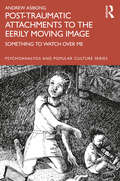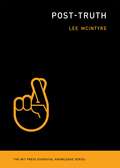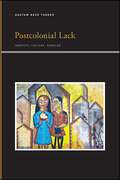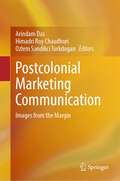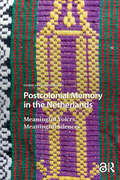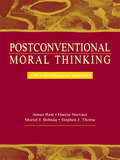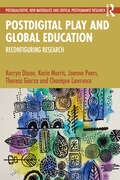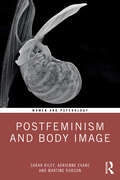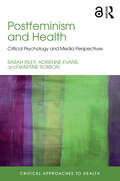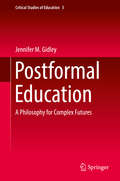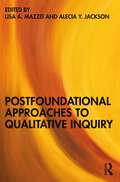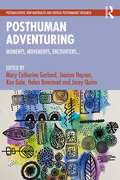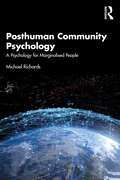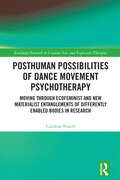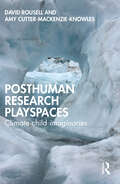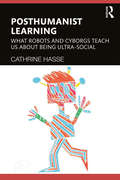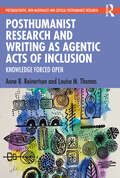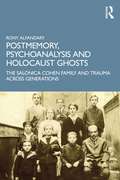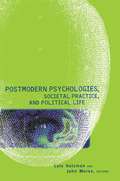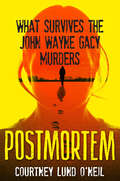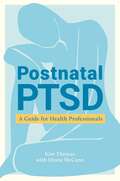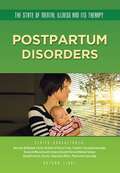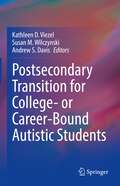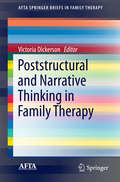- Table View
- List View
Post-traumatic Attachments to the Eerily Moving Image: Something to Watch Over Me
by Andrew AsibongThis book explores how traumatic experiences of impingement and neglect – in childhood and adulthood, and at both the family and the state level – may create a desire in us to be parented by certain kinds of screen media that we unconsciously believe are “watching over” us when nothing else seems to be. Andrew Asibong explores how viewers make psychical use of eerily moving images, observed in film and television and later taken into an already traumatised mind, in order to facilitate some form of reparation for a stolen experience of caregiving. It explores the possibility of a media-based “working through” of both the general traumas of early environmental failure and the particular traumas of viewers racialised as Black, eventually asking how politicised film groups in the age of Black Lives Matter might heal from a troubled past and prepare for an uncertain future through the spontaneous discussion – in the here and now – of enlivening images of potentially deadly vulnerability. Post-traumatic Attachments to the Eerily Moving Image: Something to Watch Over Me will be of great interest to academics and students of film, media and television studies, trauma studies and psychoanalysis, culture, race and ethnicity.
Post-truth (MIT Press Essential Knowledge)
by Lee McIntyreAre we living in a post-truth world, where “alternative facts” replace actual facts and feelings have more weight than evidence? How did we get here? In this volume in the MIT Press Essential Knowledge series, Lee McIntyre traces the development of the post-truth phenomenon from science denial through the rise of “fake news,” from our psychological blind spots to the public's retreat into “information silos.” What, exactly, is post-truth? Is it wishful thinking, political spin, mass delusion, bold-faced lying? McIntyre analyzes recent examples—claims about inauguration crowd size, crime statistics, and the popular vote—and finds that post-truth is an assertion of ideological supremacy by which its practitioners try to compel someone to believe something regardless of the evidence. Yet post-truth didn't begin with the 2016 election; the denial of scientific facts about smoking, evolution, vaccines, and climate change offers a road map for more widespread fact denial. Add to this the wired-in cognitive biases that make us feel that our conclusions are based on good reasoning even when they are not, the decline of traditional media and the rise of social media, and the emergence of fake news as a political tool, and we have the ideal conditions for post-truth. McIntyre also argues provocatively that the right wing borrowed from postmodernism—specifically, the idea that there is no such thing as objective truth—in its attacks on science and facts. McIntyre argues that we can fight post-truth, and that the first step in fighting post-truth is to understand it.
Postcolonial Lack: Identity, Culture, Surplus (SUNY series, Insinuations: Philosophy, Psychoanalysis, Literature)
by Gautam Basu ThakurPostcolonial Lack reconvenes dialogue between Lacanian psychoanalysis and postcolonial theory in order to expand the range of cultural analyses of the former and make the latter theoretically relevant to the demands of contemporary narratives of othering, exclusion, and cultural appropriation. Seeking to resolve the mutual suspicion between the disciplines, Gautam Basu Thakur draws out the connections existing between Lacan's teachings on subjectivity and otherness and writings of postcolonial and decolonial theorists such as Gayatri Spivak, Frantz Fanon, and Homi Bhabha. By developing new readings of the marginalized other as radical impasse and pushing the envelope on neoliberal identity politics, the book moves postcolonial studies away from the perennial topic of identity and difference and into examining the form and function of the other as excess—surplus and/or lack—in colonial and postcolonial literature, film, and social discourse. Looking at writings by Mahasweta Devi, Amitav Ghosh, Leila Aboulela, Narayan Gangopadhyay, Katherine Boo, and films by Gillo Pontecorvo , Clint Eastwood, Ryan Coogler (Black Panther), and Tony Gatlif, Basu Thakur highlights a new set of ethical and political considerations emerging as a direct result of this shift and stakes a fundamental rethinking of postcoloniality through what he calls the "politics of ontological discordance."
Postcolonial Marketing Communication: Images from the Margin
by Arindam Das Himadri Roy Chaudhuri Ozlem Sandikci TurkdoganThis volume approaches marcomm (marketing communication) from the phenomenology of markets in the context of the Global South and its postcolonial experiences. It provides a fresh perspective to the current paradigm and offers a fresh discourse on the current theories of marketing communication. The book demonstrates how marketing communication, an essentially Global North discourse reinforcing hegemony, can be critiqued and deconstructed when subjected to postcolonial critical analysis. Recognizing as commonplace, the Global South has either willingly embraced or been ideologically coerced into adopting a Western marketing communication system. This system is evident in its theories and practices, mirroring Western themes, symbols, stories, and knowledge frameworks, consequently fostering subjectivities that lack critical self-reflection and are dependent on Western influences. But what remains more interesting is how such an ideological system, mediated through a quintessential Global South modernity, generates a new habitation of modernity at the margin. Essentially a reaction from the Global South perspective, the book thoroughly examines the realities around marketing communication discourses. The book even engenders alternatives to hegemonic marketing communication discourses and a set of “other” epistemologies of alternate modernities of equity and justice. From African to Turkish, from Indian to Canadian first nations, Australian Aborigines to Polynesian-American, postcolonial subjectivities through marcomm across the globe get a voice in the volume. The collection in this volume is a decolonizing attempt that thwarts cultural globalization, examines colonial discourses, cuts across essentialized identities, mobilizes resistance, interrogates power structures and mechanisms of knowledge production, dissemination, and legitimization, and celebrates the new-formed cultural identity of the Third/Fourth World. The book is essential read for researchers, students and practitioners of Marketing who wish to gain a deeper understanding of an oft ignored aspect of marcomm.
Postcolonial Memory in the Netherlands: Meaningful Voices, Meaningful Silences (Heritage and Memory Studies)
by Gerlov EngelenhovenThis book is about postcolonial memory in the Netherlands. This term refers to conflicts in contemporary society about how the colonial past should be remembered. The question is often: who has the right or ability to tell their stories and who do not? In other words: who has a voice, and who is silenced? As such, these conflicts represent a wider tendency in cultural theory and activism to use voice as a metaphor for empowerment and silence as voice’s negative counterpart, signifying powerlessness. And yet, there are voices that do not liberate us from, but rather subject us to power. Meanwhile, silence can be powerful: it can protect, disrupt and reconfigure. Throughout this book, it will become clear how voice and silence function not as each other’s opposites, but as each other’s continuation, and that postcolonial memory is articulated through the interplay of meaningful voices and meaningful silences.
Postconventional Moral Thinking: A Neo-kohlbergian Approach
by Darcia Narv ez James R. Rest Stephen J. Thoma Muriel J. BebeauAlthough Lawrence Kohlberg provided major ideas for psychological research in morality for decades, today some critics regard his work as outmoded, beyond repair, and too faulty for anybody to take seriously. These critics suggest that research would advance more profitably by taking a different approach. Postconventional Moral Thinking acknowledges particular philosophical and psychological problems with Kohlberg's theory and methodology, and proposes a reformulation called "Neo-Kohlbergian." Hundreds of researchers have reported a large body of findings after having employed Kohlberg's theory and methods to the Defining Issues Test (DIT), therefore attesting to the relevance of his ideas. This book provides a coherent theoretical overview for hundreds of studies that have used the DIT. The authors propose reformulations in the underlying psychological and philosophical theories. This book pulls together the analysis of criticisms of a Kohlbergian approach, a rationale for DIT research, and new theoretical ideas and new research.
Postdigital Play and Global Education: Reconfiguring Research (Postqualitative, New Materialist and Critical Posthumanist Research)
by Kerryn Dixon Karin Murris Joanne Peers Theresa Giorza Chanique LawrencePostdigital Play and Global Education: Reconfiguring Research is a re-turn to a large-scale, international project on children’s digital play. Adopting postqualitative and posthumanist theories, research practices are reconfigured all the way down from what counts as ‘data’, ‘tools’, ‘instruments’, ‘transcription’, research sites’, ‘researchers’, to notions of responsibility and accountability in qualitative research. Through a series of vignettes involving complex human and more-than-human collaborators (e.g., GoPros, octopus, avatars, diaries, sackball, LEGO bricks), the authors challenge who and what can be playful and creative across contexts in the global north and global south. The diffractive methodology enacted interrupts Western developmental notions of agency that are dominant in research involving young children.The concept of ‘postdigital’ offers fresh opportunities to disrupt dominant understandings of children’s play. Play emerges as an enigmatic and shape-shifting human and more-than-human agentic force that operates beyond digital/non-digital, online/ offline binaries. By attuning to race, gender, age and language, invisible and colonising aspects of postdigital worldings the authors show how global education research can be reimagined through a posthumanist decentering of children without erasure.Postdigital Play and Global Education puts into practice Karen Barad’s agential realism, but also a range of postdevelopmental and posthumanist writings from diverse fields. The book will be of particular interest to researchers looking for guidance to enact agential realist and posthumanist philosophies in research involving young children.
Postfeminism and Body Image (Women and Psychology)
by Martine Robson Sarah Riley Adrienne EvansPostfeminism and Body Image is a groundbreaking work that provides a poststructuralist and psychosocial analysis of key issues at the intersections of body image, psychology and media. The book outlines the theoretical framework through the work of renowned philosophers, Michel Foucault and Gilles Deleuze, and their use in feminist scholarship, to address body-image issues and challenges in the context of a postfeminist sensibility. The authors rethink body image, calling into question assumptions and obligations that affect recent issues related to social-media use, body positivity, the transformation imperative, body shaming and muscular masculinity. The analysis shows the advantage of seeing body image as a form of non-linear warfare, structured by contradiction, confusion and critique, where attempts to challenge oppressive body image practices are appropriated under the guise of positive alternatives to maintain that oppression. Through real-world examples, these nuanced concepts are made relatable and comprehensible to the readers. The book also offers a number of affirmative and hopeful ways forward. This is an indispensable resource for students and professionals of Gender studies, Social Psychology and Media and Cultural Studies. It is also ideal for anyone exploring body image, self-image, postfeminism and poststructualism.
Postfeminism and Health: Critical Psychology and Media Perspectives (Critical Approaches to Health)
by Martine Robson Sarah Riley Adrienne EvansWinner of the 2021 BPS Book Award: Academic Text category, this groundbreaking book employs a transdisciplinary and poststructuralist methodology to develop the concept of ‘postfeminist healthism,’ a twenty-first-century understanding of women’s physical and mental health formed at the intersections of postfeminist sensibilities, neoliberal constructs of citizenship and the notion of health as an individual responsibility managed through consumption. Postfeminist healthism is used in this book to explore seven topics where postfeminist sensibility has the most impact on women’s health: self-help, weight, surgical technologies, sex, pregnancy, responsibilities for others’ health and pro-anorexia communities. The book explores the ways in which the desire to be normal and live a good life is tied to expectations of ‘normal-perfection’ circulated across interpersonal interactions, media representations and expert discourses. It diagnoses postfeminist healthism as unhealthy for both those women who participate in it and those whom it excludes and considers how more positive directions may emerge. By exploring the under-researched intersection of postfeminism and health studies, this book will be invaluable to researchers and students in psychology, gender and women’s studies, health research, media studies and sociology.
Postformal Education
by Jennifer M. GidleyThis book explains why the current education model, which was developed in the 19th century to meet the needs of industrial expansion, is obsolete. It points to the need for a new approach to education designed to prepare young people for global uncertainty, accelerating change and unprecedented complexity. The book offers a new educational philosophy to awaken the creative, big-picture and long-term thinking that will help equip students to face tomorrow's challenges. Inside, readers will find a dialogue between adult developmental psychology research on higher stages of reasoning and today's most evolved education research and practice. This dialogue reveals surprising links between play and wisdom, imagination and ecology, holism and love. The overwhelming issues of global climate crisis, growing economic disparity and the youth mental health epidemic reveal how dramatically the current education model has failed students and educators. This book raises a planet-wide call to deeply question how we actually think and how we must educate. It articulates a postformal education philosophy as a foundation for educational futures. The book will appeal to educators, educational philosophers, pre-service teacher educators, educational and developmental psychologists and educational researchers, including postgraduates with an interest in transformational educational theories designed for the complexity of the 21st century. This is the most compelling book on education I have read for many years. It has major implications for all who are in a position to influence developments in teacher education and educational policy. Gidley is one of the very rare scholars who can write intelligently and accessibly about the past, present and future in education. I was challenged and ultimately convinced by her contention that 'what masquerades as education today must be seen for what it is - an anachronistic relic of the industrial past'. Gidley's challenge is to 'co-evolve' a radically new education. All who seek to play a part must read this book. Brian J. Caldwell, PhD, Educational Transformations, former Dean of Education at the University of Melbourne and Deputy Chair, Australian Curriculum, Assessment and Reporting Authority (ACARA)
Postfoundational Approaches to Qualitative Inquiry
by Alecia Y. Jackson Lisa A. MazzeiPostfoundational Approaches to Qualitative Inquiry is an edited collection that aims to move beyond a critique and deconstruction of method in order to present an engagement with various postfoundational frameworks and approaches that produce new concepts and enactments. What makes this book innovative is the singular focus on postfoundational paradigms, borrowed from the humanities and sciences, that are enveloped in what is referred to as the ontological turn, the new empiricisms, and the new materialisms. Postfoundational inquiry is conceived by the editors as emergent, relational, responsive, involuntary, and inventive. While the editors name the facets of these contingent approaches and explain how they work, they do so not in order to fix a new method, but to spur new connectives. In this collection, authors take up a range of postfoundational theories such as poststructuralism, posthumanism, postcolonialism, feminist new materialism, speculative/ new empiricism, agential realism, immanent ontologies, and affect theory. Provoked by a series of reorienting questions, chapters in the book offer enactments as a way of unfurling what is unthought, not yet, and becoming. The chapters are organized according to four Openings: Atmospheres, Affects, and Hauntings; Archives, Worldings, and Sketchings; Escaping Tradition, Beginning Elsewhere, and the Politics of Doing Otherwise; Pre-personal Agencies and Thought Taking Flight. This book can be used as a standalone text in advanced qualitative inquiry courses, or as a supplementary text in courses that examine the use of theory in research.
Posthuman Adventuring: Moments, Movements, Encounters... (Postqualitative, New Materialist and Critical Posthumanist Research)
by Joanna Haynes Ken Gale Jocey Quinn Helen Bowstead Mary Catherine GarlandPosthuman Adventuring immerses readers in a transdisciplinary methodology that merges images and sounds to inspire ongoing dialogue and provoke imaginative inquiry. Through a compilation of thought‑provoking chapters, this book connects readers to original presentations by renowned posthuman thinkers and offers responses from various authors.This collection showcases groundbreaking posthuman research conducted by scholars, artists, community‑based practitioners, and doctoral students across diverse contexts, spanning from forced migration to intergenerational relationships, from plants to bears, and from collective writing to reimagining social structures. With its experimental practices and transformative encounters, this unique anthology encourages readers to embark on their own intellectual adventures and cultivate fresh concepts. Emphasizing the fluidity and emergence of ideas, this book features chapters written by individuals and collaborative groups, each opening new spaces of inquiry and experimentation. The range of topics covered is vast, drawing inspiration from unexpected sources such as crochet blankets, women’s football, trauma within Canadian residential schools, sketchbooks, postverbal learning in dementia, and preschool outings in Johannesburg. This book invites readers to speculate, make connections, and invent their own concepts while showcasing the ongoing actualization of ideas.Ideal for scholars of posthumanist thinking across the social sciences.
Posthuman Community Psychology: A Psychology for Marginalised People
by Michael RichardsPosthuman Community Psychology is an exploration of mainstream psychology through a critical posthumanity perspective, examining psychology’s place in the world and its relationship with marginalised people, with a focus on people with disabilities. The book argues that the history of modern psychology is underpinned by reductionism and individualism, which is embedded within the contemporary psychology that we know today despite the challenges from critical and community psychologists who seek a more empowering, inclusive, and activist psychology. The posthuman community psychology ideas that emerge in this book examine and intersect with mainstream psychology, critical and community psychologies, critical posthumanities and disability studies to propose an imaginative, reflective, and relational new psychology that represents a collection of possibilities that do not remain entrenched in older ways of thinking about humans and human connections. Richards proposes that psychology has the potential to evolve and make a powerful and profound difference for marginalised people, but a genuine desire for change from psychologists is essential for this to happen. Illustrating the important considerations needed when examining the relationship between the discipline of psychology and marginalised people, this book is fascinating reading for community psychology students and academics, aspiring professional psychologists, community workers, and policy makers.
Posthuman Possibilities of Dance Movement Psychotherapy: Moving through Ecofeminist and New Materialist Entanglements of Differently Enabled Bodies in Research (Routledge Research in Creative Arts and Expressive Therapies)
by Caroline FrizellThis timely book explores an eco-feminist approach to dance movement psychotherapy, with an emphasis on the posthuman possibilities of differently enabled bodies and fostering social, political and environmental justice. Using the lenses of posthumanism and new materialism, this book examines the points of convergence among dance movement psychotherapy, eco-psychotherapy and critical disability studies. It maps out the experience of building care, empathy and kinship and explores ecologically informed, embodied practices and research while offering new perspectives on these practices. Structured using thematic ‘interruptions’ between chapters to anchor the reading experience and provide coherence, chapters include case study extracts as examples from the practice, spanning group work and individual therapy with autistic and learning disabled children and young people, as well as with neurotypical adult clients in private practice. Bringing together practice and research in dance movement psychotherapy along with cutting-edge theoretical perspectives of new materialism and posthumanism, the book will be of great interest to researchers and students of dance therapy, arts therapies, eco-psychotherapy and disability studies. It will also be useful to practitioners and therapists in psychotherapy and well-being services.
Posthuman Possibilities of Dance Movement Psychotherapy: Moving through Ecofeminist and New Materialist Entanglements of Differently Enabled Bodies in Research (Routledge Research in Creative Arts and Expressive Therapies)
by Caroline FrizellThis timely book explores an eco-feminist approach to dance movement psychotherapy, with an emphasis on the posthuman possibilities of differently enabled bodies and fostering social, political and environmental justice.Using the lenses of posthumanism and new materialism, this book examines the points of convergence among dance movement psychotherapy, eco-psychotherapy and critical disability studies. It maps out the experience of building care, empathy and kinship and explores ecologically informed, embodied practices and research while offering new perspectives on these practices. Structured using thematic ‘interruptions’ between chapters to anchor the reading experience and provide coherence, chapters include case study extracts as examples from the practice, spanning group work and individual therapy with autistic and learning disabled children and young people, as well as with neurotypical adult clients in private practice.Bringing together practice and research in dance movement psychotherapy along with cutting-edge theoretical perspectives of new materialism and posthumanism, the book will be of great interest to researchers and students of dance therapy, arts therapies, eco-psychotherapy and disability studies. It will also be useful to practitioners and therapists in psychotherapy and well-being services.
Posthuman research playspaces: Climate child imaginaries
by Amy Cutter-Mackenzie-Knowles David RousellPosthuman research playspaces: Climate child imaginaries addresses the need for new forms of climate change education that are responsive to the rapidly changing material conditions of children’s socioecological worlds. The book provides a comprehensive understanding of how posthumanist concepts and methods can be creatively developed and deployed in collaboration with children and young people. It connects climate change education with posthumanist studies of childhood in the social sciences and environmental humanities. It also offers opportunities for readers to encounter new theoretical and methodological approaches for collaborative art, inquiry, and learning with children. Drawing on three years of participatory research undertaken with 135 children in the Climate Change and Me (CC+Me) project, it takes children’s creative and affective responses to climate change as the starting point for the co-production of knowledge, community engagement, and the transformation of pedagogy and curriculum in schools. Thinking through process philosophy, and in particular, the works of Whitehead and Deleuze, the book develops new concepts and methods of creative inquiry which situate children’s learning, aesthetic production, and theory-building within a more-than-human ecology of experience. The book presents a series of generative openings and propositions for future research in the field of climate change education, while also offering wide-ranging applications for graduate students and researchers in childhood and youth studies, the environmental arts and humanities, cultural studies of science and technology, educational philosophy, and environmental education.
Posthumanist Learning: What Robots and Cyborgs Teach us About Being Ultra-social
by Cathrine HasseIn this text Hasse presents a new, inclusive, posthuman learning theory, designed to keep up with the transformations of human learning resulting from new technological experiences, as well as considering the expanding role of cyborg devices and robots in learning. This ground-breaking book draws on research from across psychology, education, and anthropology to present a truly interdisciplinary examination of the relationship between technology, learning and humanity. Posthumanism questions the self-evident status of human beings by exploring how technology is changing what can be categorised as ‘human’. In this book, the author applies a posthumanist lens to traditional learning theory, challenging conventional understanding of what a human learner is, and considering how technological advances are changing how we think about this question. Throughout the book Hasse uses vignettes of her own research and that of other prominent academics to exemplify what technology can tell us about how we learn and how this can be observed in real-life settings. Posthumanist Learning is essential reading for students and researchers of posthumanism and learning theory from a variety of backgrounds, including psychology, education, anthropology, robotics and philosophy.
Posthumanist Research and Writing as Agentic Acts of Inclusion: Knowledge Forced Open (Postqualitative, New Materialist and Critical Posthumanist Research)
by Louise M. Thomas Anne B. ReinertsenPosthumanist Research and Writing as Agentic Acts of Inclusion: Knowledge Forced Open looks at the true value and possibilities of 'learning' and knowledge within the emerging field of New Public Governance by examining, through a posthumanist lens and other perspectives, the paradoxical knowledge situation we are in today. This book addresses the constitution of knowledge as an uncertain process, understanding text as spaces for entanglements of knowledge – knowledge not as certainty but as uncertainty – and writing as the act and art of engaging with these entanglements. Through examining research from multiple perspectives, text, stories as narrative are constructed as data – showing ethnographic engagements between writers, readers and texts. The authors show how to construct messy entanglements of continual, always already constant thinking and becomings, through the art and science of research and writing as knowledging processes. Suitable for scholars of posthumanist thinking in Education and the social sciences, this book challenges the academy to look at new ways of thinking with and through knowledge and showing the importance of such processes.
Postmemory, Psychoanalysis and Holocaust Ghosts: The Salonica Cohen Family and Trauma Across Generations
by Rony AlfandaryThrough the collection of letters sent by members of a Jewish family between 1923 and 1942, this fascinating book explores phenomenological and psychoanalytical aspects of the Holocaust and its associated trauma, and the impact on future generations of the same family. This book charts a postmemorial study of the Cohen family of Salonica which branched out to Paris and Tel-Aviv during the 1920s and 1930s. The exploration of the contents of four boxes containing hundreds of letters, pictures and other documents portray a microhistory of one family that was once a part of a thriving community. Showing how the shadows of trauma can be passed through the generations, the book uncovers the tragedies that befell the Cohen family, and how the discovery of these materials has affected existing family members. In an intriguing work of postmemory research and analysis, this book appeals to both scholars of the Holocaust and psychoanalysts interested in the unconscious impact of history.
Postmodern Psychologies, Societal Practice, and Political Life
by Lois Holzman John MorssFirst published in 2000. Routledge is an imprint of Taylor & Francis, an informa company.
Postmortem: What Survives the John Wayne Gacy Murders
by Courtney Lund O'NeilIn the vein of the bestselling I&’ll Be Gone in the Dark, this compelling work of true crime explores the aftershocks of "Killer Clown" John Wayne Gacy's crimes with a uniquely intimate slant, as the daughter of a key witness probes her mother's personal experiences and the legacy of murder within a family, a community, and the American psyche.&“A beautifully written memoir about the haunting impact of a sensational crime. I'm still thinking about it.&” —Gregg Olsen, #1 New York Times bestselling author On a December night in 1978, Courtney Lund O&’Neil&’s mother, teenaged Kim Byers, saw her friend Rob Piest alive for the last time. At the end of his shift at the pharmacy where they both worked, fifteen-year-old Rob went outside to speak to a contractor named John Wayne Gacy about a possible job. That night Rob became Gacy&’s final victim; his body was later found in the Des Plaines River. Kim&’s testimony, along with a receipt belonging to her found in Gacy&’s house, proving that Rob had been there, would be pivotal in convicting the serial killer who assaulted and killed over thirty young men and boys. Though she grew up far from Des Plaines, Courtney has lived in the shadow of that nightmare, keenly aware of its impact on her mother. In search of deeper understanding and closure, Courtney and Kim travel back to Illinois. Postmortem transforms their personal journey into a powerful exploration of the ever-widening ripples generated by Gacy&’s crimes. From the 1970s to the present day, his shadow extends beyond the victims&’ families and friends—it encompasses the Des Plaines neighborhood forever marked by his horrific murders, generations of the victims&’ families and friends, those who helped arrest and convict him, fandom communities, and many others. Layered and thought-provoking, Postmortem is a complex story of loss and violence, grief and guilt, and the legacy that remains long after a killer is caught.
Postnatal PTSD: A Guide for Health Professionals
by Kim Thomas Shona McCannPostnatal PTSD, often referred to as birth trauma, is an underdiagnosed and misunderstood condition. Often mistaken for postnatal depression and with 4% of women developing the condition after giving birth, it is essential that health professionals learn to recognise and prevent postnatal PTSD.The book supports professionals to better understand, recognise, treat and help prevent birth trauma. It covers the impact of postnatal PTSD on bonding and relationships, birth trauma in Black, Asian and minority ethnic communities, how to support women having another baby and more.An accessible guide to supporting parents with postnatal PTSD, this book is essential reading for healthcare professionals and those involved with the birthing process.
Postpartum Disorders (The State of Mental Illness and Its Ther)
by Autumn LibalEveryone told Sandra she would be happy. People described in rapt detail the overwhelming feeling of love and purpose that would envelop her at her daughter's birth. Nothing prepared Sandra for the heavy fog of dread and loss that descended upon her in the delivery room on the day she gave birth. When the nurse handed her the crying, bruised, purple-pink bundle, Sandra had to fight the urge to hand the bundle back and run. She wanted to turn the clock back nine months before any of this had happened. When she did spend time with her daughter, instead of singing soothing lullabies, Sandra found herself whispering, "I hate you. I wish you had never been born." Pregnancy, childbirth, and early motherhood is supposed to be a time filled with the joy and wonder of bringing a new life into the world. Unfortunately, some women find that the struggles of early motherhood are accompanied by multiple sorrows that clash with this picturesque ideal. As difficult as it may be for a person who has not experienced it to understand, Sandra's feelings are quite common among new mothers struggling with the physical, emotional, and social upheaval that follows giving birth. In this transitional period, some women become more vulnerable to depression and may experience psychiatric disorders such as postpartum depression and postpartum psychosis. Postpartum Disorders will tell you more about these disorders, the experiences of the women who have faced them, and the treatments that can help.
Postsecondary Transition for College- or Career-Bound Autistic Students
by Andrew S. Davis Susan M. Wilczynski Kathleen D. ViezelThis book examines issues relating to postsecondary transition from high school to college or competitive vocational settings for Autistic adolescents and young adults. It details the intervention and consultation services essential to prepare students for postsecondary life. The volume addresses the academic, social, self-regulation, and self-sufficiency skills that adolescents and young adults must develop to ensure a successful transition from high school to college and workplace. It focuses on the role of school psychologists in supporting Autistic students as they enter adulthood but is also relevant across numerous disciplines. Key topics addressed include:Using cognitive and neuropsychological assessment results to inform consultation about college entrance and vocational activities.Evaluating and strengthening academic skills for older Autistic adolescents who plan to enter college or workforce.Helping Autistic students increase their use of social, coping, and behavioral skills.Strengthening Autistic students’ use of self-management and self-sufficiency skills needed to independently perform required tasks in college and the workplace.Selecting an appropriate college and accessing available supports that match student needs.Assisting Autistic students and their families in accessing available services and developing skills that improve employment outcomes. Postsecondary Transition for College- or Career-Bound Autistic Students is a must-have resource for researchers, professors, and graduate students as well as clinicians and other professionals in clinical child and school psychology, special education, social work, developmental psychology, behavioral therapy/rehabilitation, child and adolescent psychiatry, and all interrelated disciplines.
Poststructural and Narrative Thinking in Family Therapy
by Victoria DickersonThis brief applies variations in poststructural thinking and practice to the field of family therapy. Poststructural thinking pervades the world of therapeutic practice in ways that are often invisible to both the theoretician as well as the practitioner. In this brief, the authors focus on what poststructuralism has brought to our understanding. What follows are chapters that speak to training and teaching principles as well as to practices that draw on ideas about "becoming," "relationality," and "the aesthetics of engagement. " Each chapter builds on the other with the last one reprising a key component of narrative understanding. From a teaching institution in Auckland, NZ to an online training program in Minneapolis, from new thinking about "auto-ethnography" to a "de-centered" practice to "poetic" resistance, the chapters in this brief offer exciting ideas and practice possibilities.
